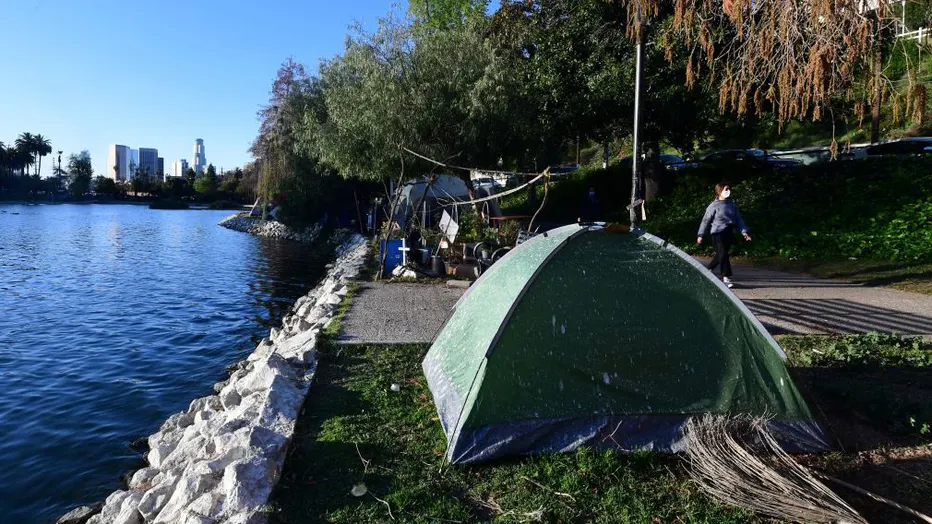Supreme Court allows outdoor sleeping bans amid rising homelessness
SCOTUS allows punishment for homeless sleeping
In 6-3 decision, the justices overturned lower court rulings that deemed it unusual and cruel to punish those who are sleeping outside that have nowhere else to go.
The U.S. Supreme Court has approved a measure that allows cities to punish people for sleeping outside, a ruling that comes as record numbers of people are without a permanent place to live in the country.
In a 6-3 decision, the high court reversed a ruling by a San Francisco-based appeals court that found outdoor sleeping bans amount to cruel and unusual punishment.
"Homelessness is complex. Its causes are many. So may be the public policy responses required to address it," Justice Neil Gorsuch’s opinion stated. "The Constitution’s Eighth Amendment serves many important functions, but it does not authorize federal judges to wrest those rights and responsibilities from the American people and in their place dictate this Nation’s homelessness policy."
The case is the most significant on the issue to come before the high court in decades and comes as cities across the country have wrestled with the politically complicated issue of how to deal with a rising number of people without a permanent place to live and public frustration over related health and safety issues.
"Sleep is a biological necessity, not a crime. For some people, sleeping outside is their only option," Justice Sonia Sotomayor countered in her dissent. "The City of Grants Pass jails and fines those people for sleeping anywhere in public at any time, including in their cars, if they use as little as a blanket to keep warm or a rolled-up shirt as a pillow. For people with no access to shelter, that punishes them for being homeless. That is unconscionable and unconstitutional. Punishing people for their status is ‘cruel and unusual’ under the Eighth Amendment."
The case came from the rural Oregon town of Grants Pass, which appealed a ruling striking down local ordinances that fined people $295 for sleeping outside after tents began crowding public parks. The U.S. 9th Circuit Court of Appeals, which has jurisdiction over the nine Western states, has held since 2018 that such bans violate the Eighth Amendment in areas where there aren’t enough shelter beds.
Reaction to SCOTUS ruling
The ruling was not welcomed everywhere and some cities, such as Seattle, said their approach to encampments will not change. A spokesperson for the Portland, Oregon, mayor’s office said it was prevented by a state law from making major changes based on the court decision.
Cody Bowman, a spokesperson for Portland Mayor Ted Wheeler, a Democrat who has seen his two terms buffeted by discontent over the city’s homeless crisis, said they hoped the decision would push the state Legislature to take up the issue and "see this opportunity to consider the tools cities truly need to manage public camping, provide sufficient shelter, and keep our streets safe and clean."
Boise, Idaho’s mayor, a Democrat, likewise said the city would not change its approach to those sleeping in public spaces, which includes case management and supportive housing.
"In Boise, we take care of people. Criminalizing homelessness has never, and will never, solve the problems associated with homelessness," said Mayor Lauren McLean. "We must address the root causes with proven strategies, like permanent supportive housing, that empower our residents to stay housed and thrive in their community."
California Gov. Gavin Newsom, who is scheduled to sign a state budget in the coming days that includes another $250 million in grants for local governments to clear homeless encampments, said the ruling gives state and local officials "the definitive authority" to enforce policies that clear unwanted encampments.
"This decision removes the legal ambiguities that have tied the hands of local officials for years and limited their ability to deliver on common-sense measures to protect the safety and well-being of our communities," Newsom said in a statement after the ruling, which came the same day Los Angeles released an annual count of the homeless population.
Court hears arguments on outdoor sleeping ban
In recent weeks, the court heard arguments that showed the stark terms of the debate over homelessness in Western states like California, which is home to one-third of the country’s homeless population.

FILE-Tents housing the homeless at an encampment in Echo Lake Park in California. (Photo by FREDERIC J. BROWN/AFP via Getty Images)
"Where do we put them if every city, every village, every town lacks compassion and passes a law identical to this? Where are they supposed to sleep? Are they supposed to kill themselves, not sleeping?" Justice Sonia Sotomayor said.
Solving homelessness is a complicated issue, added Justice Brett Kavanaugh. He questioned whether ticketing people for camping helps if there aren’t enough shelter beds to hold everyone, but also raised concerns about federal courts "micromanaging" policy.
Advocacy groups argued that allowing cities to punish people who need a place to sleep will criminalize homelessness and ultimately make the crisis worse as the cost of housing increases.
Homelessness rises across US
Homelessness in the United States grew a dramatic 12% last year to its highest reported level, as soaring rents and a decline in coronavirus pandemic assistance combined to put housing out of reach for more people.
More than 650,000 people are estimated to be homeless, the most since the country began using the yearly point-in-time survey in 2007. Nearly half of them sleep outside. Older adults, LGBTQ+ people and people of color are disproportionately affected, advocates said.
This story was reported from Los Angeles. The Associated Press contributed.

